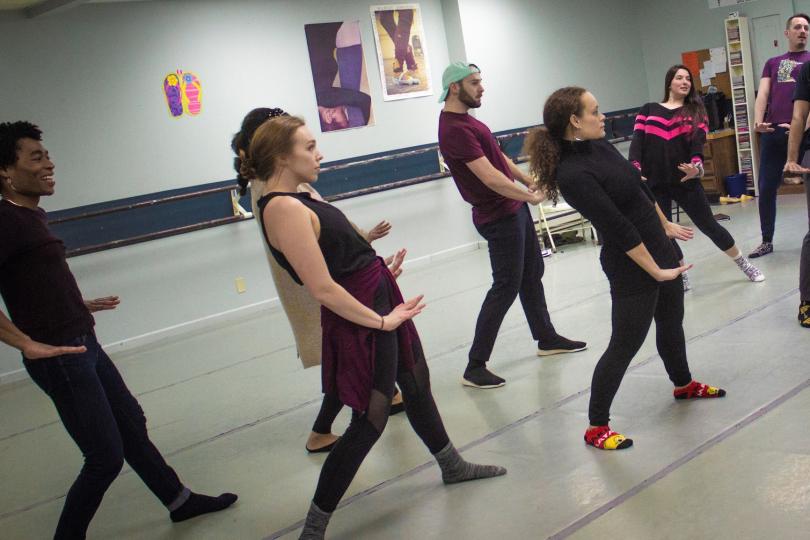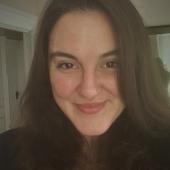The Ordway Cabaret's "Gotta Dance!"

Director of Education and Producing Associate Kelli Foster Warder talks to Minnesota Playlist’s lead editorr Erin McNeil about the one-night public event Ordway Cabaret: Gotta Dance! This interview has been edited for length and clarity.
EM: First things first! For our audiences who might not be familiar, what is the Cabaret series? How does it function within your artistic and educational programming at The Ordway?
KFW: This program was in the works before I joined the Ordway in 2018. This Cabaret series was conceived by the Producing Artistic Director Rod Kaats and Vice President of Education and Engagement, Shelley Quiala to fill a need in creating accessible, relevant, Broadway-connected content for school and public audiences that featured out Twin Cities artists, while directly addressing the progressive and problematic moments in the Broadway canon. Previous to Cabaret, the Ordway produced the Broadway Songbook series under the direction of James Rocco. While the Broadway Songbook Series was created for public audiences and was often centered around a composer’s life work, it quickly developed a school following when it expanded into the Ordway’s educational offerings. The opportunity to expose school groups to Broadway content in an affordable way has been a driver in both cases. So many times, when we bring in a Broadway show, the tickets can be too costly. The Broadway Songbooks program allowed us to pick some of the most moving numbers and share them with students. Giving students a connection to musical theater in this affordable way (we would also include busing) is very important to us as an institution.
Building on the success of Broadway Songbooks, the Cabaret Series continues to resonate with our educational mission. I picked it up as a project when I started as my skill set, lived experience and role aligned perfectly with the work we are trying to do in this series. I’ve enjoyed serving in a creative leadership role since the first Cabaret. Additionally, we are able to give opportunities and space to voices often neglected by mainstream musical theater – in particular women and people of color. So now, these performances also serve as a space to celebrate but also critique this artform we all have a passion for. You know, productions like Hamilton have started to change the conversation, but evenings like this can show us where Broadway has fallen short.
From the way you are talking about this, I can really see the way that your role as Director of Education and Producing Associate overlap with this event.
Yes, this program comes from a place of education as much as it does from programming. It was an intentional marriage that tries to create for audiences more obvious cross over and synergy between the two. As an artist of color, teacher, producing associate, and my work as a diversity coordinator, I can be more than just the director of this show. I get to be an active content creator, and I get to use my skills to help bring out these personal connections with the music and stories.
When you see an Ordway Cabaret, the performers speak in their words talking about their experiences and how musicals have impacted their lives. You get to see who they are as artists and as people. Audiences are often so surprised because they think they are coming for one thing (a night filled with selections from classic musicals) but you also get to really know these artists. We bring in artists you have probably seen performing all over town, but you get to know them on a completely different level.
So far, Gotta Dance is the fifth performance in the Cabaret Series. What made you decide to focus on dancers this time around?
In the past Cabaret’s we have done other things, such as women singing and rewriting the lyrics to songs about women. Focusing on the theme of often-marginalized voices, we thought that dancers would be an ideal group to highlight this time.
Particularly with a Cabaret-style performance, often dance is completely left out because it takes so much work to get it ready and the number of performances is often low. For Gotta Dance! we only have three performances (two for school groups and one for the general public on Thursday, February 20th).
Even within musicals, dancers are often overlooked, but they are such an important part of most productions. We often don’t hear much from dancers. They are masters of their bodies and as their craft. Working on this production, I kept thinking about the phrase that people are “born to dance but not born dancers.” It takes so much work and sweat to develop such skill.
How did the selection process work? Did you approach dancers you already knew, or did you pick the pieces first and then cast?
Working directly with the artists themselves is key to our process. Because we have only had a few evenings thus far, I still consider this a pilot program. The casting for this project flowed organically while making sure we had a diverse representation of Twin Cities based artists. We want to make sure that we represent many viewpoints and are able to connect with a broad range of audiences. Some of the artists I already knew, have seen or worked with before, and some I haven’t. The Gotta Dance! cabaret had great collaborators in Joey Miller, Maureen Sherman-Mendez, and Raymond Berg. The dancers themselves are key to the creative process telling their own stories and in many cases creating their choreography.
For all the evenings I have a general theme, but I wait until the casting comes together to really finalize the show. Once the artists are cast, we talk about what we want to create together. In the case of Gotta Dance!, we talked at length about what dances have impacted these artists in musical theater, and they shared compelling stories that complete the evening.
Moving forward with other Ordway Cabarets, I hope to do more of an open call to artists and to continue to build a larger network.
What can audiences expect from the performance?
There is really no exact formula to these evenings except great Broadway music and hearing directly from the artists themselves! I am so thankful to be doing this work. We have such a vibrant community here, and I want artists and audiences to know there is a place for them at the Ordway. Theater is such an important societal impactor—it is a place where people can come together to hear about experiences unique from their own that can impact how we interact with each other. This series provides a great context to revisit some of the old assumptions and stereotypes of Broadway as well as celebrate when these musicals have helped break barriers. There will be numbers from Singing in the Rain, Footloose, A Choirs Line – audiences will get glimpses of all their favorites alongside the artists’ stories!
Kelli Foster Warder is the Director of Education and Producing Associate at the Ordway where she is responsible for vision and implementation of school programs, and producing theatrical-based work for young people and engagement for all ages of Broadway audiences. She comes to the Ordway after having the role of Director of Education for the Hennepin Theatre Trust in Minneapolis where she oversaw all of the education and engagement work, including the state-wide Spotlight Education high school musical theatre program, the annual Spotlight Showcase and all access programming. Kelli has performed, taught and choreographed for a variety of companies including Theater Latté Da, Chanhassen Dinner Theatres, The 5th Avenue in Seattle, Asolo Rep in Florida among others. She has worked as a choreographer, teacher, diversity coordinator and coach for over 25 years at a number of Minnesota schools, and has directed and choreographed internationally in both La Paz, Bolivia and Panama City, Panama.




